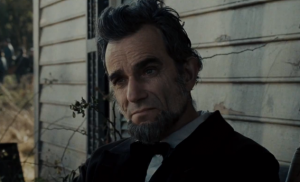Daniel Day-Lewis commands the essential ‘Lincoln’
-
 Of all the wonderful things about Steven Spielberg’s “Lincoln,” one thing obviously stands apart: Daniel Day-Lewis.
Of all the wonderful things about Steven Spielberg’s “Lincoln,” one thing obviously stands apart: Daniel Day-Lewis.The two-time Oscar winner is magnetic as the plain-spoken politician who battled to end slavery behind closed doors while the nation tore itself apart on the battlefields. Day-Lewis’ Lincoln often settles arguments with anecdotes—stories and speeches that comprise the bulk of the film’s two-and-a-half-hour running length. All this talking makes for thoroughly compelling entertainment.
“Politician” is the best way to describe the man at the center of “Lincoln.” Unmoved in his desire to pass a Constitutional amendment to ban slavery in the United States, Lincoln resorts to bribing, trickery and intimidation to get the job done (or rather, assigns a trio of spinsters to do the dirty work). This is the still the kind-hearted hero of the textbooks. He’s simply doing what must be done for the better of the country.
Spielberg and screenwriter Tony Kushner (“Munich,” Angels in America”) skip over most of Lincoln’s life and focus on the four-month process of passing the amendment. Many players are instrumental to its success, and Spielberg casts half of Hollywood to help the audience keep the players straight: notably David Strathairn, James Spader, Hal Holbrook and Tommy Lee Jones in his best performance in years as radical abolitionist Thaddeus Stevens.
Sally Field takes on the difficult task of Mary Todd Lincoln, a woman known as much for her insanity as her influence on her husband. Her scenes with Day-Lewis best illustrate the damage and suffering the war has done not just to the Lincoln family, but to the nation itself.
“Lincoln” wouldn’t work if not for the dense and engrossing screenplay by Kushner. There’s so much detail in the dialogue, though it never feels like a history lesson. Lincoln’s often meandering stories often frustrate the people around him, but Day-Lewis makes every word essential. Nobody tells a story, gives a speech, or explains the legality of the Emancipation Proclamation as thrillingly as Lincoln in this film.
Spielberg’s movies can sometimes veer into unnecessary sentimentality (see last year’s “War Horse”), and considering the subject matter, nobody would have blamed him for juicing the film with a little more rah-rah patriotism. Yet “Lincoln” is surprisingly restrained in its theatricality. The extraordinary politicking of the time period provides enough drama—especially the shouting matches that take place between Thaddeus Stevens and his opponents in Congress.
For almost its entire length, “Lincoln” distinguishes itself as an accurate and entertaining portrait of our most famous president without the tedious trappings of the usual biopic. No flashbacks to Honest Abe’s childhood, no rise to fame, etc.
The only slip is in the final 10 minutes, when Spielberg chooses to include Lincoln’s assassination. This part of the story we all know. The thrill of “Lincoln” is discovering how the man lived and governed through the most difficult time in our history. This film is a masterwork on that subject.
Grade: A